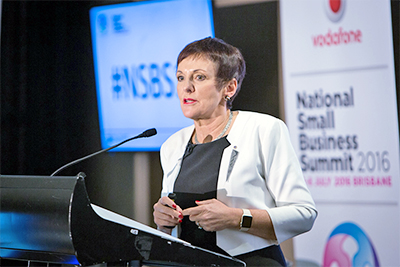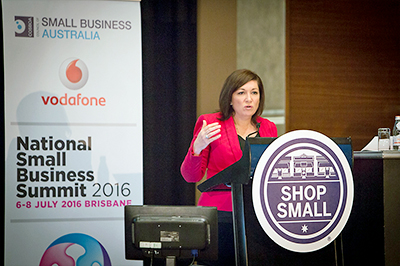Small Business Summit spells out Australia's challenges
COUNCIL of Small Business of Australia (COSBOA) CEO Peter Strong may not have been able to personally attend the recent Vodafone National Small Business Summit – on doctor’s orders, coping with a fever – but his video address to the event raised the event’s temperature.
Mr Strong got straight to the point about where politicians, union leaders and big business ‘oligopolies’ were going wrong in relation to Australia’s business environment.
Impossible to keep him away completely, Mr Strong said he addressed the Summit by video as a demonstration of how vital technology is to how businesses operate today – a prime theme during the two-day event.
Mr Strong said COSBOA was “disappointed with the Australian Labor Party’s approach to small business” in two key areas.
“We believe if the Labor Party had have embraced small business, for example, supported the Effects Test and increased the threshold to $10 million to define a small business; there’s a good chance they would have been in power, because we would have supported them and not condemned them,” Mr Strong said.
Mr Strong also pledged that he and COSBOA would continue to fight penalty rates, “as the only people that suffer from this is small business people, as the unions have all struck deals, so big business does not have to pay”.
These views may have challenged the official opening address of Queensland Minister for Innovation, Science and the Digital Economy – and Minister for Small Business – Leeanne Enoch, but as she said Queensland was a small business-friendly state and understood the challenges the sector faced. 
Ms Enoch said how crucial small business is to the state’s economy and as an employer – for investing in small business meant more jobs.
“The Queensland Government wants to help small business start, grow and employ to ensure we secure the next generation of leaders and small business owners,” Ms Enoch said.
The Minister expressed to business leaders the importance of collaboration in supporting small businesses, driving them to “fulfil their passion and drive a new generation of leaders and ideas that will put Queensland on the map”.
A keynote session entitled Critical Business Infrastructure featured Energy Australia head of marketing segments and planning, Renee Garner, and Vodafone Australia chief strategy officer and corporate affairs director, Dan Lloyd.
Ms Garner said she knew from direct experience that small business people were spirited and the lines between family and business were always blurred. Her parents and family ran their own business as she was growing up.
During the session, Ms Garner outlined how small business people were so busy with running and building their businesses that they did not always consider energy savings. However, she said, in order for a business to operate successfully both reliability and sustainability in energy should be thought of as intricately linked.
When she asked the room if small businesses would be willing to pay three times more for sustainable energy, about 99 percent of people said no. Ms. Garner responded by saying the control that technology gives us, means we will in the future have on-and-off ability, wherever we are, leading to significant cost reductions.
Similar challenges and advantages faced small business in the telecommunications area, Vodafone’s Dan Lloyd said. 
Mr Lloyd presented an overview of Vodafone’s infrastructure and how the business had overcome challenges, mainly the lack of competition in the market, which drives costs up.
“Australia had one of the least competitive telecommunications industries in the world,” Mr Loyd said, before challengers like Vodafone came into the market.
Importantly, Mr Lloyd discussed The Effects Test and pressed the urgent need to continue the work to enact Section 46.
Elizabeth Skirving from Rural Business Tasmania also addressed the session, highlighting how small businesses were often compromised by disruption to transport, supply distribution and telecommunications.
Ms Skirving stressed because these three elements were vital to business operation, small business needed to take steps to protect themselves and have a crisis plan in place.
“For example, what does a coffee shop do if the water supply is obstructed?” Ms Skirving asked.
She urged businesses to identify the local critical business structure and that way they would be “one step closer to protecting themselves should something happen”. Unfortunately, she lamented, too many businesses do not do this until a situation had played out.
The Australian Competition and Consumer Commission’s (ACCC) Michael Schaper and Australian Small Business and Family Enterprise Ombudsman, Kate Carnell, also addressed the summit.
Mr Schaper provided a regulator update to help small businesses understand the ACCC’s position and its activities. Ms Carnell explained in detail how the Ombudsman would support small business.
Ms Carnell’s Ombudsman role, which she commenced in March 2016, is set be an independent advocate for small business. Ms Carnell promised to make life easier for small business people by addressing important issues such as cutting red tape, making payment times shorter and providing support, which helps owners to their businesses better.
Ms Carnell then took part in panel sessions on how to work with small business, with the ATO and Institute of Certificate of Bookkeepers, and “how not to deal with small business” alongside the Australian Livestock and Rural Transporters Association (ALRTA). The session used ALRTA’s experience with the road safety remuneration issue as a case study.
ends

 How to resolve AdBlock issue?
How to resolve AdBlock issue?